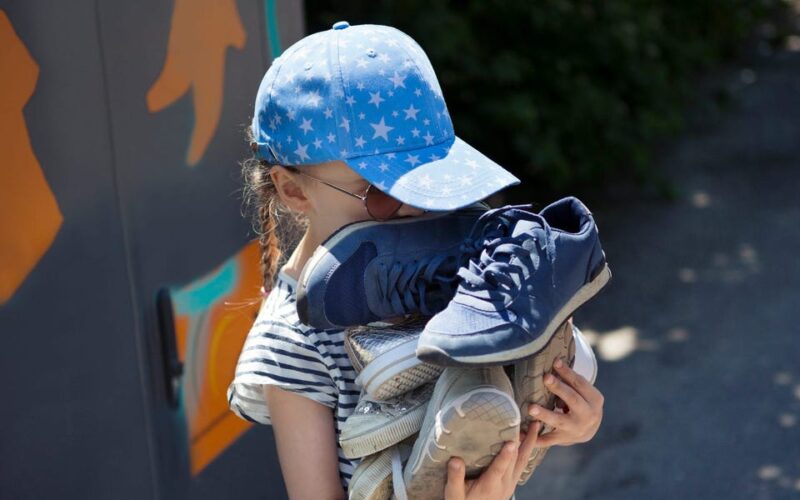Tweens are coming for wasteful consumerism.
Some Gen Alpha kids are taking a stand against buying too much stuff — and dragging their parents along for the ride.
“They do decluttering missions,” said Yuriy Boykiv, the CEO of the e-commerce accelerator agency Front Row Group, who has two children aged 10 and 12.
They “don’t have a lot of stuff,” he told Business Insider.
Boykiv counts himself among a growing cohort of parents under pressure to clear out their closets and donate the excess.
Before a mall trip, his kids and their friends “are like, ‘Listen, before we buy something, we’ll just get rid of most of the stuff we have,'” he said.
“Some of them are very minimalist in nature.”
A taste for quality
Gen Alpha, anyone aged 14 and under, seems more selective about spending than the generations that came before them, even when all they have is their allowance.
They are still likely to be big spenders. Thanks to their obsession with Sephora, many are already fueling sales in skincare.
They are predicted to be a major economic force — Business Insider recently cited an analyst predicting they would wield $5.46 trillion of spending power by 2029.
But that is tempered by a strong conscience. Gen Alpha is learning about the environment and the climate crisis at school, realizing early the consequences of fast fashion and consumerism — including its own choices.
Children are lobbying their parents to be more discerning as well. A recent survey by the consultancy McCrindle found that 80% of parents have been influenced by their Gen Alpha kids to be more environmentally aware as they spend.
“Not only do they care about where the product is coming from, but they go to their parents and say, you have way too much stuff, or this thing is not good,” Boykiv said. “They just want to consume quality stuff.”
The underconsumption core aesthetic has also been trending in recent months, with online creators hoping to “de-influence” their audiences and inspire them to buy less.
Many Gen Zers and millennials would like to do the same but struggle to resist the lure of budget-fashion sites.
Gen Alpha, at least so far, seems purer of mind.
A 2024 survey of 1,000 Gen Alpha parents found that 63% of their kids care about sustainability.
In 2019, the digital agency Wunderman Thompson Commerce also surveyed 4,000 Gen Alphas and found that 66% wanted to buy from companies that were trying to have a positive impact on the world, and that 18% wanted to buy products that were non-plastic and sustainable.
Saving the turtles
Julie Peak, a decluttering expert and professional organizer, told BI that a recent job was clearing out a kid’s playroom.
The mom had realized the kids weren’t playing with their toys anymore. When Peak asked them why, they said they’d rather have one big thing they could play with in lots of different ways than a bunch of small things.
Peak said she’s also noticed children as young as 8 recommending their parents be more mindful about their impact on the environment.
“I had one client’s child request to the parents that they wanted to start using reusable bags,” she said. “They said that they wanted to protect the turtles.”
Peak said she thinks Gen Alpha is starting to see through the tricks of consumerism early, noticing that their older family members aren’t getting that much joy out of their impulse purchases.
“We know so much more now, and our kids are getting more exposure to our footprint and our choices and how they affect the environment,” Peak said. “I think they’re more conscientious of that.”
Laura Ascher, a DIY blogger who focuses on minimalism and sustainability on her site Our Oily House, told BI she’s also seen Gen Alpha’s “passionate advocacy for decluttering.”
“This generation is being raised in an era of social media and seems to have rejected the impulsive consumerism that is often associated with older generations,” she said.
Return of the mall
An unexpected sign of this shift — as shown by Boykiv’s kids — could be heading back to the mall. While Zoomers and millennials prefer to shop online, Gen Alpha specifically likes shopping in-store.
Stephen Yalof, the CEO of the retail operator Tanger, told BI that malls are cool again for tweens.
They like to “shop in packs,” he said, looking for “very specific brands and very specific products,” such as Stanley Cup water bottles, Drunk Elephant serums, and Glow Recipe cosmetics.
Shopping smart
Gen Alpha may also benefit from having a wider range of sources for their research.
“We’re seeing that they’re a smart generation, and they have more information than anyone else,” said David Delisle, an author, financial-literacy expert, and dad of two boys.
Helenor Gilmour, the director of strategy at the kid-focused consultancy Beano Brain, told BI that Gen Alpha are “savvy spenders and savers” who are “very aware of the importance of doing the right thing.”
“The savviest amongst them are becoming mini entrepreneurs,” she added, through reselling their old things.
They’re “emotionally intelligent about where, when, and how to treat themselves,” Gilmour said, and still go to Amazon, Temu, and Shein for bargains.
Overall, Delisle doesn’t think it’s likely that every Gen Alpha child is above consumerism. But they probably will grow up to be better equipped to navigate it, and work out what value means to them.
“With my guys, one is a spender, and he isn’t a minimalist, and he will always have a cluttered room full of a million different hobbies and things,” Delisle said. “The other one, that stuff doesn’t matter at all. He just wants to go to the beach and play with his friends.”
Source link
lol

